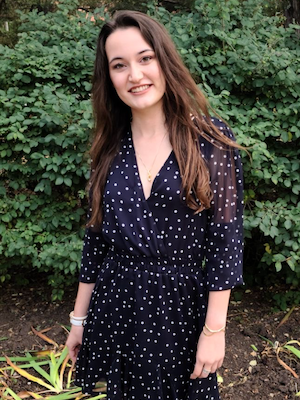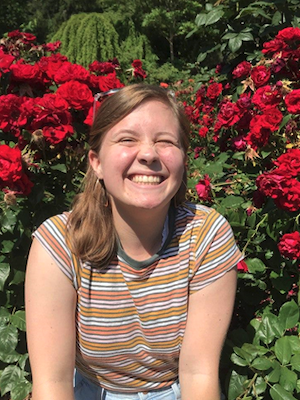Tutor Spotlights
 698 Days
698 Days
By Eric Welch
Ever wondered what true passion for tutoring and helping others looks like? Look no further than Niah Wilson—MSU senior, criminology and English literature student, and two-year Writing Center veteran. From taking every available tutoring opportunity to penning an article examining tutoring processes, it’s evident Niah has a strong and unique passion for her work.
Niah’s path to becoming a Writing Center tutor began in high school, where she made her first foray into tutoring. As she was exploring the possibility of attending MSU, she became aware of the school’s writing center and the opportunity to tutor there. “I joke that the Writing Center is why I chose MSU, but that’s actually not far from the truth,” Niah says, laughing. “I thought, ‘Wow, writing tutoring! That’d be so fun.’” Since Niah joined the Writing Center, she’s taken the opportunity to tutor as much as she can. In addition to the standard fall and spring academic semesters, Niah has chosen to tutor in the summer and winter terms. “It's quieter, a little lonelier, but still fun,” Niah recounts, adding, “I love interacting with different students and learning from them and their writing. Thinking about the mechanics of [writing], it’s such a fun puzzle.”
Over many hours of tutoring, Niah has developed concrete techniques to better help writers. To relate to a writer who made a mistake, she might say, “‘Oh, I do this too,’ or, ‘This is super common, it's not devastating.’” She explains, “I find that people who feel like they're bad writers never actually are.” Niah has also come to appreciate the community atmosphere of the Writing Center. “I think Writing Center coworkers are so empathetic and easy to talk to.”
Both writing and helping others are in the picture for Niah going forward. In the fall of 2021, she worked with fellow tutor Abby Bernard on an article examining course-adjacent writing groups known as writing studios. The piece is set to be published in Writing Lab Newsletter, a journal that features writing center scholarship. Niah describes the piece as “a toolbox of ways that [can be used] to foster reciprocity in studios, both online and in person.” Additionally, Niah’s experience as a writing tutor has influenced her future career plans—she’s now considering pursuing a path in education. “It's become apparent that I really like working with other people and like helping them grow,” she says. Niah also has an interest in conducting social science research within academia or for private companies.
It’s clear Niah has enjoyed her experience as a peer tutor. She even counted the total number of days that she worked at the MSU Writing Center: 698. “I would work here for a lot longer if I didn't have to leave when I graduated,” she says, laughing. Fellow tutors, staff, and all others who had an opportunity to work with Niah are reluctant to see her leave as well—her patience, kindness, and above all, her passion for helping others will serve her well wherever the future takes her.

More Than Just a Line on a Résumé
By Abbey Mohr
As a senior in the education field who wants to eventually end up as a history teacher, Jon Sorensen has always highly valued learning. He originally began working at the MSU Writing Center to help build his résumé and to hopefully help teach his peers things about grammar and writing. It wasn’t until his first actual sessions as a tutor that he realized just how much the Writing Center could teach him as well. Thrust into the “fire and flames,” as he put it, Jon was sitting on the orange couches of the Writing Center, not yet even on the schedule, when his first writer walked in. The writer needed a quick appointment as their assignment was due very soon. “I stumbled through it, but it was helpful to both parties overall, I think,” he says with a laugh.
As a tutor, Jon has around 45 minutes to give feedback and constructively help his peers with their writing. As a teacher, he says, “I’ll maybe have half that time to grade papers and give feedback.” He’s learned the value of prioritizing different types of feedback and that tutoring sessions aren’t one-size-fits-all. “Some students are going to come in that just need positive reinforcement, to build up their confidence,” he explains, while others might need more concrete help with specific parts of their work. Jon recalls a session where a student’s essay was almost finished, but there was just something she didn’t like about it. Her three pages were printed out in front of him, and Jon simply grabbed two of them and physically switched their position on the table. Suddenly, the paper was organized beautifully and the student was extremely pleased with their work. Keeping sessions flowing, conversational, and fun has helped Jon with his reciprocal learning process at the Writing Center.
Jon says he “can only learn so much from reading the theory” behind teaching and tutoring. The true learning comes from hands-on experience. Over the course of his hundreds of sessions, Jon has kept his style adaptable and discovered the “practical teaching benefits” that he can integrate with his educational background to further his future goals. He extolls the virtues of the job at the Writing Center, a place where he has not only been encouraged to grow but also where he has found countless friends. Even if you do not want to be an educator, or if you’re going into a less writing-heavy field, Jon says “writing is always used, feedback is always used.” Jon encourages his peers to use the Writing Center: “Make the best of your resources” and be open to the possibility of sharing a synergistic learning experience with a tutor who treats you as an equal.
 Writers Need Writers
Writers Need Writers
By Markita Williams
In the spring of 2020, Trixie received an email from Jess Carroll, her creative writing instructor and the Assistant Director of the Writing Center, encouraging her to apply for a position as a peer tutor. She was excited but hadn't been to the Writing Center before—even as a writer. “I was one of those people that was very much of the mindset like, ‘oh well I know how to write, and I know how to write a good paper, I don't need to go into the Writing Center.’ I don't think I viewed it as remedial, but I was like, oh, that's not something I personally need.”
Despite this mindset, Trixie had long appreciated the social aspects of writing. She had always loved writing, especially the creative variety, and felt that “it's not [usually] an individual writer sitting alone in their room—there’s editors, there's readers. Getting to be a part of that was something that I was really intrigued with.” Once she became a part of the Writing Center team, she found a community-driven group of people interested in knowing about and learning from each other. Even though Trixie considers herself “a hardcore English major” with a writing major and literature minor, the number of tutors who fell outside of that box provided a welcome opportunity for community building. With coworkers ranging from engineers to historians, mathematicians to sociologists, Trixie notes, “we have all of these really interesting backgrounds and areas of expertise that create a really interesting community where we're able to continue to talk and learn about writing from different perspectives even outside of sessions.”
This welcoming environment encouraged her to start making appointments for herself, which fostered her learning as both a writer and a tutor. Taking this step allowed her to both understand and overcome the feelings of apprehension that many students might feel when scheduling a first appointment. Feelings of “I don’t feel like I need this” and “not wanting other people criticizing [my] writing” allowed Trixie to reflect on her own progress. Being tutored gave her insight into how she could make writers feel like they belonged when working with her. “I have come to realize how it is helpful, beneficial, and productive for everybody,” she mentioned, noting that opportunities for learning, growth, and finding community were far greater than she first imagined.
Through her time at the Writing Center, Trixie has found that her community has helped not only to support her but also to offer a clear window into how important a social component is to successful writing. Being able to surround herself with a group of driven and uniquely experienced individuals has changed the way she views writing and academics in general, making for an all-around life-changing experience. What’s her advice to tutors and writers? “Ask questions and learn from each other… we're not floating in little cubicles all by ourselves. We [are] a community of practice!”
 And You Get Paid For It
And You Get Paid For It
By Lauren Warrenfeltz
If you were to run into Darian D’Antuono on MSU’s campus, you’d know you found her by the way her warmth and energy seem to greet you before she gets the chance. As a student athlete and Captain for MSU’s Dance Squad, a long-time peer tutor at the Writing Center and a Secondary Education major, Darian’s drive and compassion have continually found her in leadership positions on and off campus. When asked how she might pitch working as a peer tutor at the Writing Center, Darian said: “I think my writing has grown exponentially in ways that I don’t think you could reproduce outside of this experience. It’s an opportunity to be around something that helps you improve academically and intellectually, and you get paid for it. That’s my pitch.”
As Darian reflects on her time as a tutor, she describes several concrete skills she’s picked up along the way. Her writing, ability to think and engage critically about different areas of academia, and her ability to manage time while working towards work-life balance all improved throughout her five semesters at the Writing Center. “I don’t know that I had those skills sets at like 18, 19.” But as Darian describes these tangible benefits, it’s noticeable how much of Darian’s time at the Writing Center is marked by a growing awareness of the intimate—and often vulnerable—nature of working with others.
“My skills in terms of how to communicate with people, how to read people, assess their needs, especially when they’re feeling vulnerable, and help them in an efficient and effective manner have drastically improved. So has my awareness of my own strengths and my weaknesses, or dispelling that expectation that you’re ever going to be the expert at every single aspect of a job.” Darian realized quickly that tutoring was going to demand a sensitivity to others. “I think it’s just about trying to pull someone in and be comfortable enough with you to openly talk about something that they’re probably little self-conscious about.” After a thoughtful pause Darian added, “I think that helped my relationships with my friends and family.” She learned to elevate the knowledge, abilities, and experiences of the people in her life.
The Writing Center not only offers peer tutors a place to develop their own skills as writers and thinkers, but also creates an environment to think carefully and critically about what it means to engage with others. “It definitely helped me as a teacher but also just on an interpersonal level...It taught me to keep facilitating and asking questions in a way that builds meaningful conversations.” For Darian, the Writing Center is a place to think about what it means to truly listen to others, especially when they’re feeling vulnerable, and what it means to learn from those who seek us out for help. It’s a place to grow into yourself while also growing into a community. And you get paid for it.
 Connection Center
Connection Center
By Natasha Gesker
Sage sees herself as introverted, but when she engages in a conversation, she becomes completely invested. For someone who thrives off human connection, a job at the Writing Center where she could work with people day in and day out seemed perfect! However, when she was hired, the Writing Center had completely shifted to an online platform due to the pandemic. “I was still really excited to work here but it was definitely kind of isolating.”
Starting off a new job, with new co-workers, and new work expectations is difficult on a regular day, let alone when learning how to do everything from home. Yet, with all the isolation, Sage still found a way to form meaningful connections through tutor education work and her peer tutor mentor, Abby. “It's comforting to have that community and know that the new tutors are going through the same thing.” Sage’s ability to connect with other tutors and writers strengthened her love for the Writing Center during a pandemic. “I had so many really great experiences just helping people with their writing.” So, when it came time for the Writing Center to be back in person, Sage was ready.
Sage was originally introduced to the Writing Center through her connection with the Writing Center’s director. “Having [Michelle Miley] as a mentor pushing me outside of my box to do things that I didn't think I could have has really been impactful.” With Michelle’s help, Sage has been able to grow through a Writing Center internship. As Sage explains, working as the outreach intern made her, “rethink what sort of language I'm using, the reach, our audience, and where we might be lacking.”
Sage was not only impacted by the staff at the Writing Center, but the writers as well. In just a single session Sage can connect with a writer. She raved about one session with a writer where, “We were both joking around, and [the writer] was just being really humorous, and it felt like I was talking to someone that I have known for a really long time.” Between writers, fellow tutors, and faculty mentors Sage is surrounded by those who care about her the way she cares about others. Sage has found a home in the Writing Center full of people that encourage her to grow and strengthen her empathetic heart.
 Let That Bridge Be Built
Let That Bridge Be Built
By Cole Shultz
“I’m dibble-dabbling in learning Kazakh right now, because my brain can’t stop learning languages and understanding cultures.” Trevor, a proud polyglot and double major in Industrial & Management Systems Engineering and Photography, is no stranger to developing the ways he communicates. While his time at the Writing Center hasn’t taught him any new languages, it has deepened his ability to communicate in the English language and his ability to help others use it.
When asked about how he has changed in his time as a tutor, he credited the Writing Center with improving his ability to communicate and guide others. To him, communication involves managing the seemingly contradictory identities of “being a leader and a follower at the same time.” In the Writing Center, he manages a similar contradiction by being both a listener and a speaker. Since he recognizes that “the best way to learn is to teach,” he has come to value the peer-to-peer tutoring model of the Writing Center. At the start of a session, he practices these ideals by giving the writers space and allowing them to take charge of how they want the session to go. “I like to get to know the writer. I don’t want to just dive in and make assumptions.” He recognizes the importance of meeting people where they are and helping them get to where they want to be.
His development in the Writing Center was helped by the leadership exhibited by the staff, particularly Writing Center Assistant Director Jess Carroll. “Jess [is] a very understanding leader,” he noted, appraising “her ability to communicate on so many different levels.” When working on a research inquiry project, he made an appointment with her. While the session itself was good and not particularly noteworthy, her unexpected follow-up a week later was. That follow-up reminded him of the importance of “building a connection,” a practice he has taken to heart. He once asked two different repeat writers why they kept working with him, and they said it was because he cared about them. The takeaway message? “Let that bridge be built.” Leave it to the engineer to use a bridge metaphor.
After his time at MSU, Trevor intends to research and work towards the rehabilitation of the Aral Sea. Despite how challenging that may be, his experiences as a tutor will serve him well because they have helped him become confident in as both a leader and a communicator. His study of Kazakh won’t hurt either.
